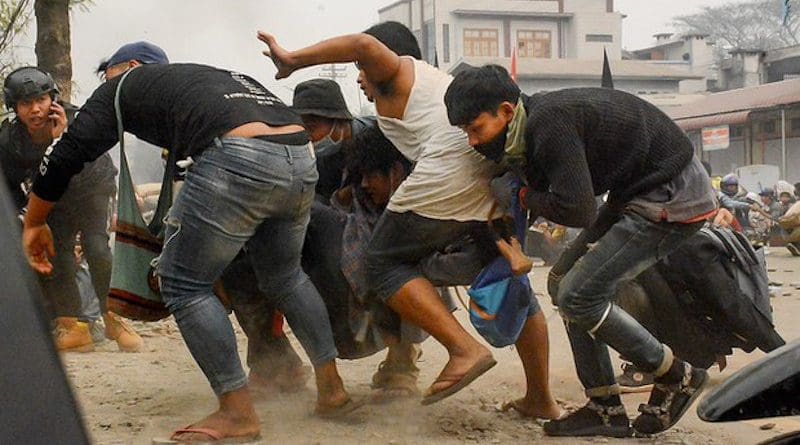UN Expert Greets ‘New Blow’ Against Myanmar Junta’s Finances
By IDN
By Jaya Ramachandran
The United States has taken one of the most significant steps to date against the Myanmar junta, first by sanctioning not only individuals but the State Administrative Council (SAC) itself; and second, by opening the door to targeting those who continue to do business with the junta and therefore aid and abet their relentless attacks against the people of Myanmar.
UN human rights expert Tom Andrews has welcomed the announcement, highlighting, in particular, the US designation of the junta itself, or the SAC for sanctions. “It is imperative that the international community ramp up the size and scope of sanctions as the junta ramps up its repression of the people of Myanmar,” said the UN Special Rapporteur on the situation of human rights in Myanmar.
“The designation of the SAC strikes a new blow to the junta’s finances. It is a significant step in the right direction.”
As a result of the designation of the SAC under US Executive Order 14014, all United States nationals are prohibited from providing funds, goods, or services that benefit the State Administrative Council. Additionally, transactions with, involving, or for the benefit of the State Administrative Council that are undertaken in US dollars are prohibited to the extent such transactions involve the US financial sector.
This means that not only US banks, but also non-US banks and other entities that undertake transactions with a US nexus could face criminal and civil penalties in the United States if they wilfully facilitate US dollar transactions for the benefit of the SAC.
The naming of the SAC paves the way for further designations of individuals or entities that are determined to have “materially assisted, sponsored, or provided financial, material, or technological support for, or goods or services to” the State Administrative Council.
“This is a warning to all those who are willing to conduct business as usual with the junta,” Andrews said. “Those who continue to aid and abet this murderous enterprise—be they international businesses, banks, arms traffickers, or government entities providing financial, technological or other support—are now on notice that they themselves could face sanctions.
“I am hopeful that this action will be a wake-up call. Not only is doing business with the junta morally reprehensible but it could also now mean being cut off from the US financial system and/or facing criminal or civil penalties in the United States. If doing the right and just thing is not a factor in one’s decision making, then perhaps protecting one’s self-interest will be.”
Andrews also welcomed the new sanctions imposed by the United Kingdom and Canada, including sanctions targeting the junta’s profiting from the timber and gems trade.
“The coordination of these sanctions by the US, UK, and Canada is a welcome development,” the UN expert said.
“Hopefully it will lead to a tough, fully coordinated multilateral sanctions regime that enables nations to deliver the most powerful blow possible against the horror that is being inflicted on the people of Myanmar.”
Andrews said, however, that more must be done, and done quickly.
“The revenue that they continue to seize from the oil and gas sector has become a lifeline for the junta. Profits from this sector are estimated to be close to what is needed to supply the forces that are keeping them in power,” he said. “We know the junta’s sources of funds are limited and that the income from oil and gas sales helped previous juntas withstand international sanctions. The people of Myanmar cannot afford for history to repeat itself.”
Andrews also urged countries that have yet to impose sanctions on Myanmar to take action. “I urge those countries that have yet to impose costs on the junta for its illegal coup and its systematic atrocities and human rights violations to reconsider. Now is the time to step up.”
A former member of the US Congress from Maine, Andrews is a Robina Senior Human Rights Fellow at Yale Law School and an Associate of Harvard University’s Asia Center. He has worked with the National Democratic Institute for International Affairs and parliamentarians, NGOs and political parties in Cambodia, Indonesia, Algeria, Croatia, Serbia, Ukraine and Yemen. He has been a consultant for the National Coalition Government of the Union of Burma and the Euro-Burma Network and has run advocacy NGOs including Win Without War and United to End Genocide.
Special Rapporteurs and Working Groups are part of what is known as the Special Procedures of the Human Rights Council. Special Procedures, the largest body of independent experts in the UN Human Rights system, is the general name of the Council’s independent fact-finding and monitoring mechanisms that address either specific country situations or thematic issues in all parts of the world. Special Procedures’ experts work on a voluntary basis; they are not UN staff and do not receive a salary for their work. They are independent of any government or organization and serve in their individual capacity.

